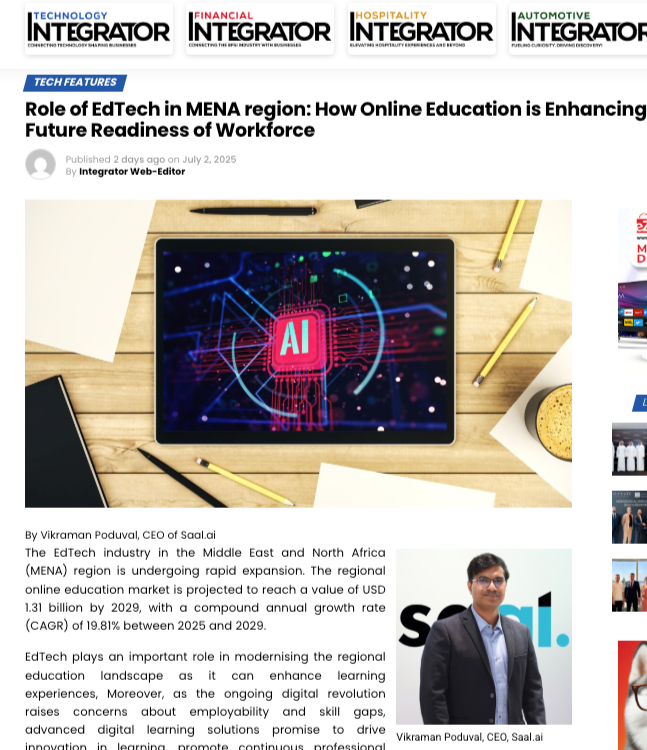The EdTech industry in the Middle East and North Africa (MENA) region is undergoing rapid expansion. The regional online education market is projected to reach a value of USD 1.31 billion by 2029, with a compound annual growth rate (CAGR) of 19.81% between 2025 and 2029.
EdTech plays an important role in modernising the regional education landscape as it can enhance learning experiences, Moreover, as the ongoing digital revolution raises concerns about employability and skill gaps, advanced digital learning solutions promise to drive innovation in learning, promote continuous professional development, and help foster a digitally literate workforce, aligning with the demands of a knowledge-based economy.
For instance, Saal’s AI-based learning platform synergises the capabilities of AI and big data to create detailed skill maps for individuals, align them with target roles or desired career paths, and streamline their journey to professional success. Furthermore, online educational platforms help optimise the search for the right talent by maintaining a comprehensive skill and occupation-based database, a competency mapping engine, leadership development modules, and robust mechanisms for aggregating data from diverse systems.
UAE’s role as a key driver of the regional EdTech revolution
The UAE stands out as a trailblazer and a true pioneer, catalysing the ongoing growth of the regional online education industry through its groundbreaking initiatives, such as the recent decision to make AI a formal subject in the national curriculum. This makes the UAE one of the first nations to integrate AI as an integral facet of its foundational education framework.
This strategic decision is poised to help develop a robust local talent pipeline by developing AI literacy at an early age and building a self-sustaining ecosystem consisting of future developers and engineers. It will also help equip learners with critical thinking and technical skills, which are necessary to succeed in a tech-centric world. This exemplary strategic endeavour also provides a practical model that the rest of the world can aspire to emulate, highlighting the nation’s enduring commitment to innovation and positioning education as the cornerstone of broader economic transformation.
In such a scenario, there is a need for a smart, scalable platform that promotes competency-based education using AI algorithms that can tailor content, assessments, and learning paths in real-time based on student needs. Such advanced systems also feature unique capabilities like AI-powered learning companions, intelligent feedback and progress monitoring, real-time risk detection, and predictive analytics to guide timely intervention.
Furthermore, these tools enable learners to consistently enhance market-specific skills while gaining powerful insights via behavioural tracking, cohort analysis, and content effectiveness metrics. Institutions can leverage these tools to ensure improved student outcomes, optimised teaching strategies, and better alignment with industry demands. Advanced AI learning platforms also automate routine academic tasks and integrate multilingual AI chatbots that answer student queries and flag knowledge gaps, enhancing institutional efficiency and elevating the learner’s experience.
AI-powered learning: Key to nurturing a future-ready workforce
In the MENA region, there is a growing disconnect between education and job market needs, led by rapid digitalisation and economic diversification efforts. To ensure that the regional educational sector can keep pace with evolving market demands, it is vital to prioritise competency-based, personalised learning. For instance, ‘AcademyX’, Saal.ai’s flagship AI-powered competency development platform designed for educational institutions, government bodies, and enterprises, can create personalised learning journeys based on user profiles, performance trends, and evolving industry requirements. Such platforms also support national efforts to enhance employability, promote lifelong learning, and foster a digitally fluent, innovation-driven workforce. It also enables educational institutions to identify learning gaps as early as in the first semester, empowering educators to initiate timely interventions and ensure improved academic outcomes, engagement, and retention.
Such a holistic approach is critical to making sure that educational goals and outcomes are aligned with broader market requirements so that students gain practical skills that can enhance their employability and future readiness. Saal.ai’s ‘DigiXT’ platform plays a vital role in this regard as it empowers both learners and educators to work with real-world datasets, while familiarising them with industry-grade tools, AI research capabilities, and cloud-based analytics environments.
Though EdTech holds the potential to transform the MENA region’s educational landscape, it is essential to address key challenges like access, affordability, and quality. Furthermore, it is vital to understand the role of AI in promoting personalised feedback and interactive methods. By embracing AI-powered online education as a tool that complements traditional education, the regional education industry can catalyse its growth while achieving improved learning outcomes and greater educational equity.

